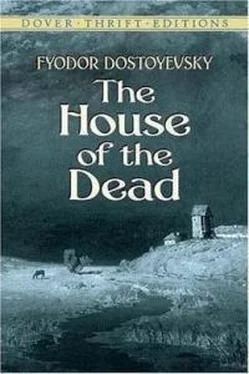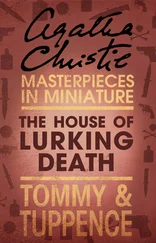Федор Достоевский - The House of the Dead
Здесь есть возможность читать онлайн «Федор Достоевский - The House of the Dead» весь текст электронной книги совершенно бесплатно (целиком полную версию без сокращений). В некоторых случаях можно слушать аудио, скачать через торрент в формате fb2 и присутствует краткое содержание. Год выпуска: 2014, Издательство: epubBooks Classics, Жанр: Русская классическая проза, на английском языке. Описание произведения, (предисловие) а так же отзывы посетителей доступны на портале библиотеки ЛибКат.
- Название:The House of the Dead
- Автор:
- Издательство:epubBooks Classics
- Жанр:
- Год:2014
- ISBN:нет данных
- Рейтинг книги:4 / 5. Голосов: 1
-
Избранное:Добавить в избранное
- Отзывы:
-
Ваша оценка:
- 80
- 1
- 2
- 3
- 4
- 5
The House of the Dead: краткое содержание, описание и аннотация
Предлагаем к чтению аннотацию, описание, краткое содержание или предисловие (зависит от того, что написал сам автор книги «The House of the Dead»). Если вы не нашли необходимую информацию о книге — напишите в комментариях, мы постараемся отыскать её.
The House of the Dead — читать онлайн бесплатно полную книгу (весь текст) целиком
Ниже представлен текст книги, разбитый по страницам. Система сохранения места последней прочитанной страницы, позволяет с удобством читать онлайн бесплатно книгу «The House of the Dead», без необходимости каждый раз заново искать на чём Вы остановились. Поставьте закладку, и сможете в любой момент перейти на страницу, на которой закончили чтение.
Интервал:
Закладка:
Chapter II
The Dead-house
Our prison was at the end of the citadel behind the ramparts. Looking through the crevices between the palisade in the hope of seeing something, one sees nothing but a little corner of the sky, and a high earthwork, covered with the long grass of the steppe. Night and day sentries walk to and fro upon it. Then one perceives from the first, that whole years will pass during which one will see by the same crevices between the palisades, upon the same earthwork, always the same sentinels and the same little corner of the sky, not just above the prison, but far and far away. Represent to yourself a court–yard, two hundred feet long, and one hundred and fifty feet broad, enclosed by an irregular hexagonal palisade, formed of stakes thrust deep into the earth. So much for the external surroundings of the prison. On one side of the palisade is a great gate, solid, and always shut; watched perpetually by the sentinels, and never opened, except when the convicts go out to work. Beyond this, there are light and liberty, the life of free people! Beyond the palisade, one thought of the marvellous world, fantastic as a fairy tale. It was not the same on our side. Here, there was no resemblance to anything. Habits, customs, laws, were all precisely fixed. It was the house of living death. It is this corner that I undertake to describe.
On penetrating into the enclosure one sees a few buildings. On each side of a vast court are stretched forth two wooden constructions, made of trunks of trees, and only one storey high. These are convicts' barracks. Here the prisoners are confined, divided into several classes. At the end of the enclosure may be seen a house, which serves as a kitchen, divided into two compartments. Behind it is another building, which serves at once as cellar, loft, and barn. The centre of the enclosure, completely barren, is a large open space. Here the prisoners are drawn up in ranks, three times a day. They are identified, and must answer to their names, morning, noon, and evening, besides several times in the course of the day if the soldiers on guard are suspicious and clever at counting. All around, between the palisades and the buildings there remains a sufficiently large space, where some of the prisoners who are misanthropes, or of a sombre turn of mind, like to walk about when they are not at work. There they go turning over their favourite thoughts, shielded from all observation.
When I met them during those walks of theirs, I took pleasure in observing their sad, deeply–marked countenances, and in guessing their thoughts. The favourite occupation of one of the convicts, during the moments of liberty left to him from his hard labour, was to count the palisades. There were fifteen hundred of them. He had counted them all, and knew them nearly by heart. Every one of them represented to him a day of confinement; but, counting them daily in this manner, he knew exactly the number of days that he had still to pass in the prison. He was sincerely happy when he had finished one side of the hexagon; yet he had to wait for his liberation many long years. But one learns patience in a prison.
One day I saw a prisoner, who had undergone his punishment, take leave of his comrades. He had had twenty years' hard labour. More than one convict remembered seeing him arrive, quite young, careless, thinking neither of his crime nor of his punishment. He was now an old man with gray hairs, with a sad and morose countenance. He walked in silence through our six barracks. When he entered each of them he prayed before the holy image, made a deep bow to his former companions, and begged them not to keep a bad recollection of him.
I also remember one evening, a prisoner, who had been formerly a well–to–do Siberian peasant, so called. Six years before he had had news of his wife's remarrying, which had caused him great pain. That very evening she had come to the prison, and had asked for him in order to make him a present! They talked together for two minutes, wept together, and then separated never to meet again. I saw the expression of this prisoner's countenance when he re–entered the barracks. There, indeed, one learns to support everything.
When darkness set in we had to re–enter the barrack, where we were shut up for all the night. It was always painful for me to leave the court–yard for the barrack. Think of a long, low, stifling room, scarcely lighted by tallow candles, and full of heavy and disgusting odours. I cannot now understand how I lived there for ten entire years. My camp bedstead was made of three boards. This was the only place in the room that belonged to me. In one single room we herded together, more than thirty men. It was, above all, no wonder that we were shut up early. Four hours at least passed before every one was asleep, and, until then, there was a tumult and uproar of laughter, oaths, rattling of chains, a poisonous vapour of thick smoke; a confusion of shaved heads, stigmatised foreheads, and ragged clothes disgustingly filthy.
Yes, man is a pliable animal—he must be so defined—a being who gets accustomed to everything! That would be, perhaps, the best definition that could be given of him. There were altogether two hundred and fifty of us in the same prison. This number was almost invariably the same. Whenever some of them had undergone their punishment, other criminals arrived, and a few of them died. Among them there were all sorts of people. I believe that each region of Russia had furnished its representatives. There were foreigners there, and even mountaineers from the Caucasus.
All these people were divided into different classes, according to the importance of the crime; and consequently the duration of the punishment for the crime, whatever it might be, was there represented. The population of the prison was composed for the most part of men condemned to hard labour of the civil class—"strongly condemned," as the prisoners used to say. They were criminals deprived of all civil rights, men rejected by society, vomited forth by it, and whose faces were marked by the iron to testify eternally to their disgrace. They were incarcerated for different periods of time, varying from eight to ten years. At the expiration of their punishment they were sent to the Siberian districts in the character of colonists.
As to the criminals of the military section, they were not deprived of their civil rights—as is generally the case in Russian disciplinary companies—but were punished for a relatively short period. As soon as they had undergone their punishment they had to return to the place whence they had come, and became soldiers in the battalions of the Siberian Line. [1] Goriantchikoff became himself a soldier in Siberia, when he had finished his term of imprisonment.
Many of them came back to us afterwards, for serious crimes, this time not for a small number of years, but for twenty at least. They then formed part of the section called "for perpetuity." Nevertheless, the perpetuals were not deprived of their right. There was another section sufficiently numerous, composed of the worst malefactors, nearly all veterans in crime, and which was called the special section. There were sent convicts from all the Russias. They looked upon one another with reason as imprisoned for ever, for the term of their confinement had not been indicated. The law required them to receive double and treble tasks. They remained in prison until work of the most painful character had to be undertaken in Siberia.
"You are only here for a fixed time," they said to the other convicts; "we, on the contrary, are here for all our life."
I have heard that this section has since been abolished. At the same time, civil convicts are kept apart, in order that the military convicts may be organised by themselves into a homogeneous "disciplinary company." The administration, too, has naturally been changed; consequently what I describe are the customs and practices of another time, and of things which have since been abolished. Yes, it was a long time ago; it seems to me that it is all a dream. I remember entering the convict prison one December evening, as night was falling. The convicts were returning from work. The roll–call was about to be made. An under officer with large moustaches opened to me the gate of this strange house, where I was to remain so many years, to endure so many emotions, and of which I could not form even an approximate idea, if I had not gone through them. Thus, for example, could I ever have imagined the poignant and terrible suffering of never being alone even for one minute during ten years? Working under escort in the barracks together with two hundred "companions;" never alone, never!
Читать дальшеИнтервал:
Закладка:
Похожие книги на «The House of the Dead»
Представляем Вашему вниманию похожие книги на «The House of the Dead» списком для выбора. Мы отобрали схожую по названию и смыслу литературу в надежде предоставить читателям больше вариантов отыскать новые, интересные, ещё непрочитанные произведения.
Обсуждение, отзывы о книге «The House of the Dead» и просто собственные мнения читателей. Оставьте ваши комментарии, напишите, что Вы думаете о произведении, его смысле или главных героях. Укажите что конкретно понравилось, а что нет, и почему Вы так считаете.












